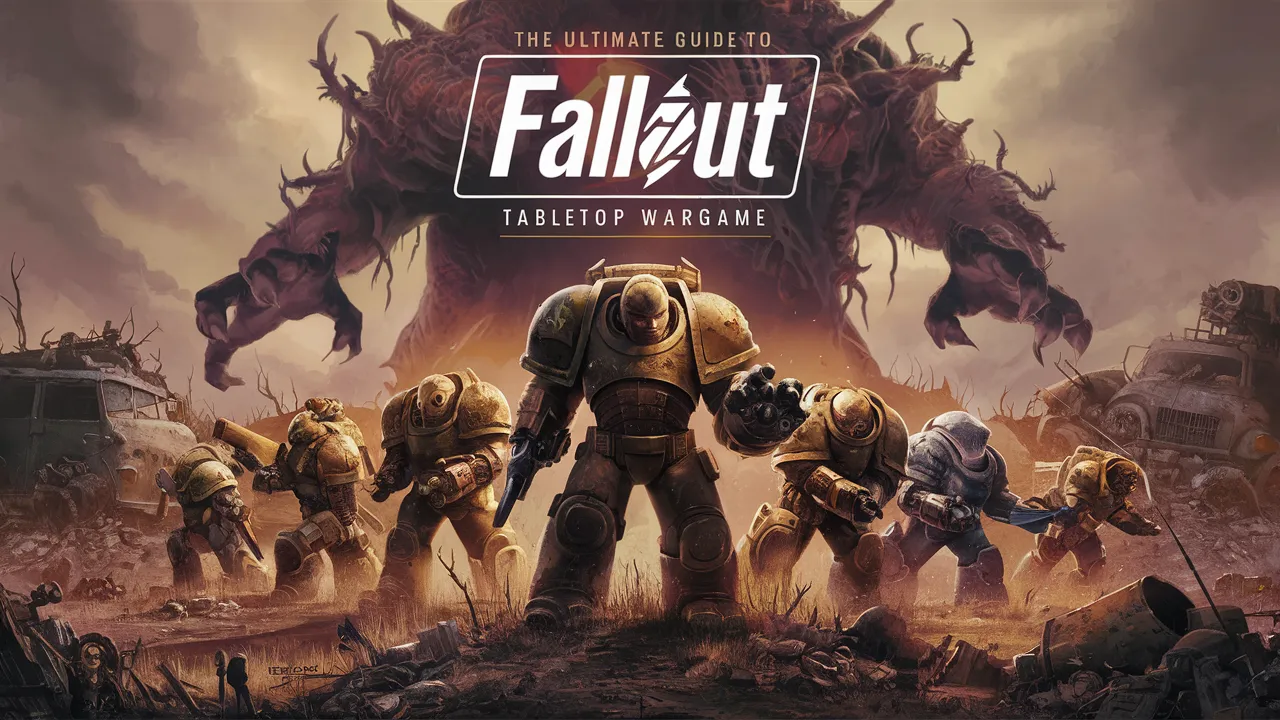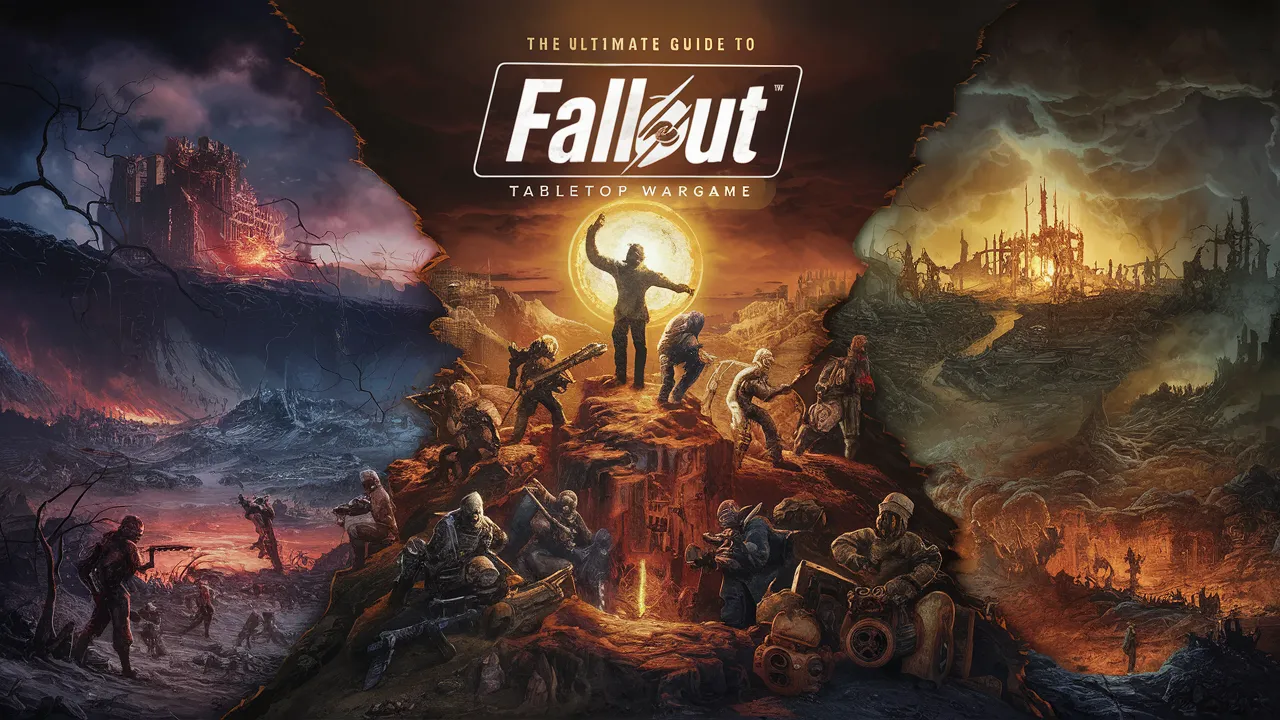Understanding the Basics of Fallout Tabletop Wargame
The Fallout tabletop wargame transports players into a post-apocalyptic universe infused with rich lore, strategy, and camaraderie. Set in the same dystopian realm as the popular video game series, this wargame allows participants to reconstruct narratives through tactical gameplay and character development. Whether you’re a seasoned wargamer or a newcomer, understanding the basics is crucial to your first steps in this immersive world.
The History and Evolution of Fallout Tabletop Wargame
The roots of the Fallout tabletop wargame trace back to the original video game series created by Interplay Entertainment in the late 1990s. Over the years, the universe of Fallout expanded, encompassing various media, including novels and comic books. The tabletop version emerged to provide fans with a means to engage in tactical warfare and explore the wasteland creatively.
As new editions and expansions were released, gameplay mechanics evolved. Today’s versions incorporate elements such as customizable factions, unique character abilities, and detailed scenarios reflecting the themes of survival and exploration present in the video games.
The Core Rules of the Game
Central to the Fallout tabletop wargame are its core rules, which govern everything from movement and combat to resource management. Players typically take turns navigating their characters across a modular battlefield, which can include ruins, settlements, and various nuanced landscapes.
Combat resolution often employs a combination of dice rolls and the characters’ attributes, adding an element of chance while also encouraging strategic positioning and tactical foresight. Players must not only consider the strengths and weaknesses of their characters but also the broader implications of their choices throughout the game.
The Role of Characters and Factions
Characters and factions play pivotal roles within the gameplay, each offering unique strengths, weaknesses, and narrative backstories. Players choose factions that resonate with their playing style. Popular factions, like the Brotherhood of Steel or the Enclave, come with distinct ideologies and unit types.
Moreover, character customization allows players to form deeply personal connections with their in-game avatars, amplifying engagement. The diverse array of characters promotes varied gameplay tactics and enhances relatability.

Building Your Fallout Wargame Collection
Starting your Fallout tabletop wargame collection can be both exciting and overwhelming. The plethora of options available can lead to decision fatigue, but with some guidance, you can navigate your way to building an impressive collection that suits your gaming style.
Choosing Your Starter Set
When diving into the world of Fallout tabletop gaming, selecting the right starter set is crucial. Most starter sets come with core rules, a selection of miniatures, and a modular board for gameplay. Look for sets that include multiple factions, as this allows you to experience a variety of gameplay mechanics and strategies.
It’s advisable to choose a starter set that aligns with your preferences, whether you want to focus on story-driven campaigns or combat-heavy scenarios. Many players find that starting with a faction whose lore they enjoy enhances their experience right from the beginning.
Expanding Your Collection: Boosters and Expansions
Once you have your starter set, the next step is to consider boosters and expansions. These additional components can significantly enrich your gameplay experience. Booster packs typically contain new models, while expansions offer new rules and scenarios that can take your battles to new heights.
Researching the contents of these packs can help you decide which additions will best complement your existing collection. Some expansions even introduce unique mechanics, such as weather effects or new objectives, that can make your sessions feel refreshingly different.
Understanding the Importance of Scenery
Scenery in the Fallout tabletop wargame is more than just decorative; it enhances gameplay tactically and thematically. Creating an immersive battlefield with hills, ruins, and barricades can significantly impact your strategic options. A well-designed board not only enhances the aesthetic appeal but also offers players various tactical positions and cover.
Investing time in crafting or purchasing quality scenery pieces can elevate your games, making each session feel unique. Furthermore, customizing your battlefield can lead to more exciting interactions and inspire creative scenarios.
Read More: Best Card Games for Two Players: Top Picks for Fun and Strategy
Strategies for Winning Fallout Tabletop Wargame
Winning in the Fallout tabletop wargame requires a blend of strategy, foresight, and a deep understanding of your faction’s abilities. While luck plays a role, the best players are those who adapt and strategize based on their environment and opponent’s moves.
Mastering the Art of Combat
Combat is often at the heart of the Fallout tabletop experience. To excel, players must develop a strong understanding of the combat mechanics, including the optimal use of weapons and the timing of their attacks. Knowing when to engage and when to withdraw can be the difference between victory and defeat.
Moreover, positioning is critical; utilizing cover and high ground can provide significant advantages. Regular practice and analyzing past games help players refine their combat strategies over time.
Utilizing Your Faction’s Strengths
Each faction in the Fallout universe has its unique strengths and abilities that can be leveraged during gameplay. Understanding your faction’s advantages allows you to play to your strengths, whether that means deploying heavily armored warriors or utilizing stealthy tactics to outmaneuver opponents.
Recognizing the strengths of your adversaries is equally important, as it allows you to anticipate their strategies and adjust your own in response. Successful players often remain flexible, adapting to shifts on the battlefield as the game unfolds.
Strategic Use of Resources
Resource management is a crucial yet often overlooked aspect of gameplay. Players must efficiently use their available resources, including ammunition, health, and special abilities. Knowing when to conserve resources for future battles versus when to deploy them for immediate gains can turn the tide of a player’s strategy.
In many scenarios, a well-timed resource deployment can leverage a minor advantage into a decisive victory. Players who master this dynamic often find themselves with a strategic edge over their opponents.
Advanced Tactics and Techniques
As you delve deeper into the Fallout tabletop wargame, exploring advanced tactics and techniques can enhance your gameplay experience and performance. These strategies often require a deeper understanding of mechanics and game theory.
Building Effective Teams
Creating synergistic teams that complement one another can enhance your overall effectiveness in battle. Players should consider pairing characters whose abilities synergize, allowing each unit to cover the weaknesses of others. For instance, pairing a strong melee fighter with a ranged support character can provide balance and adaptability.
Communication and teamwork are vital, especially in multiplayer scenarios. Developing strategies that reflect individual strengths leads to more cohesive gameplay.
Advanced Combat Strategies
Advanced combat strategies often include using feints, decoys, or distractions to mislead opponents. Mastering terrain to your advantage and employing ambush tactics can dramatically shift the outcome of fights.
Moreover, learning to predict enemy movements can allow you to set traps and orchestrate counterattacks effectively. The best players analyze combat patterns and make informed decisions based on the evolving battlefield landscape.
Mastering Scenario Play
Scenario play adds a rich narrative dimension to the Fallout tabletop experience. Each scenario can introduce unique rules, objectives, and conditions influenced by story arcs from the Fallout universe. Mastering these scenarios often means developing strategies tailored to specific challenges and goals.
Players who invest time in understanding the nuances of various scenarios, such as environmental hazards or capture-the-objective mechanics, can turn challenging situations to their advantage. This adaptability not only enhances gameplay but also deepens the narrative experience.
With these insights into the world of the Fallout tabletop wargame, you now have the tools needed to embark on your strategic journey through the wasteland. Happy gaming!
Conclusion
The Fallout tabletop wargame offers an exciting way to experience the post-apocalyptic world of Fallout in a strategic and immersive manner. With highly detailed miniatures, engaging scenarios, and deep tactical gameplay, players can recreate iconic battles or forge new paths in the Wasteland. Whether you’re a longtime fan of the Fallout franchise or new to tabletop gaming, this wargame brings the universe to life, blending narrative-driven missions with strategic combat. It’s a must-try for fans of both tabletop wargaming and the Fallout series.

Leave a Reply